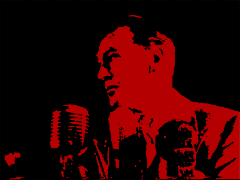


Hollywood, 1946. After a decade that brought war and peace, the behemoth that is the American movie industry has finally perfected itself. The major studios, of which there are seven (MGM, Warner Bros., Universal, Columbia, Paramount, Twentieth Century-Fox and RKO), collectively grind out 350 movies a year, and independent companies (Goldwyn, Disney, United Artists, Selznick, Monogram, Republic, etc.) bring the annual total up to 500. The year has set records with 90 million Americans going to the movies every week, paying $1.692 billion at an average price of 40.4 cents a ticket. Since most of the theatres are owned by the studios, there is a direct cash flow from the box office into the pockets of the stockholders.
But as 1947 begins there are frost heaves in Hollywood's yellow brick road. The studios have laid off 12,000 laborers and half their contract talent. Producers such as Goldwyn slash executive salaries by 50% (including his own, so you know it's serious). Nick Schenck huddles with Louis B. Mayer about cost-cutting; in late 1946, MGM — the most profitable studio-- had already trimmed $9 million in their costs. At other film companies, it's worse.
Moreover, the U.S. Justice Department is pressing harder than ever with its suit to divorce the studios from their lucrative theatre chains under the Sherman Anti-Trust Act. A new device called television has been introduced to the marketplace, and threatens to have the same impact — devastating — that radio had two decades earlier. Evangelists such as Father Coughlin and Congressman John Rankin (R-Mississippi) are preaching Anti-Semitism, a spectre that continually haunts the studio moguls, most of whom are Jewish. Motion picture trade unions, dormant during World War Two, are pushing for recognition and benefits.
And then there is Communism. Begun as a Marxist doctrine among Hollywood's "parlor pinkos" in the thirties, it was given legitimacy during the war when Russia and America were "glorious allies." But in the wake of postwar paranoia what was once romantic and egalitarian has become sinister and oppressive, particularly to right-wing forces who feel the need to define a new enemy.
In early 1947 a fact-finding committee from Washington visits Hollywood to nose around for Reds.
Communists are a minor creative annoyance to the film companies, who easily edit any "progressive" or "political" out of scripts before they get in front of the cameras. The real problem with Reds surfaces in a series of bitter labor disputes that rock the studios and which the moguls blame on a tough organizer named Herbert Sorrell, the head of the Painters Union. Years later it turns out that Sorrell was never a Communist, just a pain in the neck, but meanwhile the film companies use his aggressive tactics as an excuse to call in riot police and paint all unions with a red brush.
Ironically, the moguls had only themselves to blame. In the late 1930s they had conspired with a mobster named Willie Bioff who took over the IATSE (Hollywood's primary craft union), installed a puppet president named George Browne, and shook down the studios for $25,000 to $50,000 apiece in exchange for keeping the IA from going out on strike.
But by the Summer of 1947 even that didn't help as balance sheets report the bad news that business is off by 25 percent. Now Hollywood is not so blase when the House Un-American Activities Committee calls again bringing subpoenas. HUAC holds hearings in October and everybody is invited.
Two kinds of witnesses show up: friendly and unfriendly. The friendly ones include Louis B. Mayer of MGM, Jack L. Warner of Warner Bros., Walt Disney, actors Gary Cooper and Robert Taylor, and even Ginger Rogers' mother, Lela. The unfriendly ones include ten men — eight writers, one producer and two directors — who stand on their First Amendment rights against HUAC's inquisition.
The hearings generate heat but no light. For all the Red-baiting rhetoric tossed about, no Communist infiltration of the movies was actually established. Nevertheless, the Ten win a moral victory but lose the legal one, and on Monday, November 24, 1947 they are cited for Contempt of Congress.
That happens to be the very day that 48 film company executives meet in private at New York's plush Waldorf-Astoria Hotel. No notes are kept, no reporters are present, and only one of them will ever talk about what went on in the room. All that is known for certain is that on Tuesday, November 25 they issue a two-page mimeographed press release. That statement becomes known as the "Waldorf Peace Pact," and its intent is to mollify Congress, placate the public, and get rid of anybody who anyone even suspects of being a Communist.
The first to go are the "Unfriendly Ten." Soon there will be others.